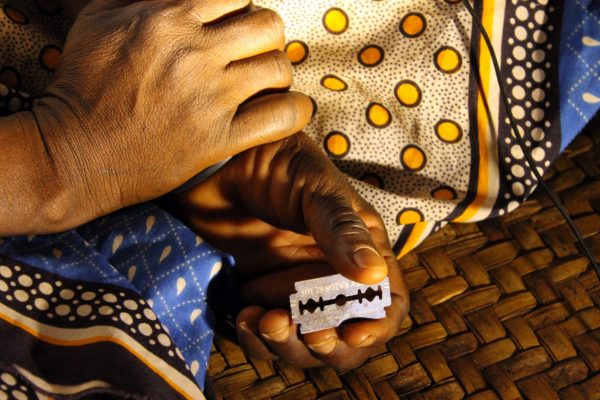Features
Female Genital Mutilation: Understanding The Far Reaching Mental Health Implications

By Paul Onehi
Female genital mutilation (FGM) is a harmful practice that has been deeply ingrained in many cultures for centuries. Also known as female circumcision, it is defined as the partial or total removal of external female genitalia for non-medical reasons.
Despite being banned in many countries, FGM continues to be prevalent in various communities, primarily in Africa, the Middle East, and parts of Asia. While the physical implications of FGM are well-documented and condemned, the mental harm caused by this practice is often overlooked.
Firstly, it is imperative to understand that FGM is a human rights violation and a form of gender-based violence. It is a clear manifestation of the patriarchal desire to control women’s bodies and sexuality. The act of cutting or removing a woman’s genitals has deep-rooted psychological effects, leading to a sense of powerlessness, shame, and betrayal. Moreover, FGM is often performed on young girls, who are unable to comprehend the gravity of the situation, causing long-lasting psychological trauma.
The immediate physical pain and trauma of FGM are often followed by long-term psychological consequences. Survivors of FGM may experience anxiety, depression, post-traumatic stress disorder (PTSD), and self-harm. The inability to express oneself or engage in sexual activity without pain can lead to feelings of low self-esteem, body dysmorphia, and sexual dysfunction. These mental health issues not only affect the individual but also have a ripple effect on their families and communities.
The United Nations Children and Education Fund Country Representative in Nigeria, Christiane Mundaute has said that more than 200 million girls and women worldwide have undergone Female Genital Mutilation. Mundaute said Nigeria accounts for 10 percent of this figure which is estimated at 19.9 million.
Speaking in Ilorin, Kwara state recently, at a symposium held to mark the International Day of Zero Tolerance for Female Genital Mutilation organised by the office of the First Lady of the State, Professor Olufolake AbdulRazaq, Mundaute stated that, the development means that, “Nigeria holds the third-highest number of women and girls who have undergone Female Genital Mutilation around the world.”
According to her, “Despite a slight decrease in the prevalence of FGM in the country, recent data shows the practice remains widespread, in Kwara and some other parts of the country.
Moving on, the secretive nature of FGM adds a layer of complexity to the mental harm caused by this practice. In many cultures, FGM is considered a taboo subject and is performed in secretive and unhygienic conditions. This not only increases the risk of physical complications but also creates a sense of isolation and shame for the survivors. The lack of support and understanding from their families and communities can intensify the mental trauma of FGM survivors.
Another crucial aspect to consider is the intergenerational impact of FGM. In some communities, FGM is seen as a rite of passage into womanhood and is deeply ingrained in cultural and religious beliefs. This has created a cycle of trauma, where mothers inflict FGM on their daughters, perpetuating the practice. This intergenerational trauma is difficult to break, and proper support and education are needed to change the mindset and end the cycle of FGM.
Also speaking on this issue, a renowned Obstetrician and Gynecologist, Prof. Oladapo Ladipo, said cutting the clitoris should be discouraged by parents.
Ladipo who is a President/Chief Executive Officer of the Association for Reproductive and Family Health said, “There is no reason for tempering with the external genitalia of a female child like cutting or squeezing the clitoris.
“There is no need at all. Clitoris has no negative effects on childbirth and if the baby’s head touches the clitoris, it is not going to do anything to the baby as far as I know and as far as science knows.
“Circumcision of the girl child should be discouraged even by the government. It does not confer any known benefit to the female child. Secondly, it can be very traumatic and the complications can be fatal sometimes. So, circumcision of the female child should be banned in any culture because there is no rationale for it.
Warning of its devastating consequences, the gynaecologist emphasized that Female Genital Mutilation (FGM) is not only a serious health risk, but also a gross violation of women’s rights, perpetuating harm and discrimination against them.”
According to the World Health Organization (WHO), Female Genital Mutilation (FGM) is a harmful traditional practice that entails the partial or total removal of the external female genitalia, or other forms of injury to the female genital organs, performed for non-therapeutic reasons.
In all, it is evident that FGM has severe mental implications, not only for the survivors but also for their families and communities. It is a violation of human rights and a form of gender-based violence that must be eradicated. Governments and organizations must work together to create laws and policies to protect girls and women from FGM.
Education and awareness campaigns must be implemented to change cultural and religious beliefs that perpetuate this practice. Proper support and access to mental health services are crucial for survivors to heal from the trauma of FGM. It is time to break the silence and critically examine the implications of female genital mutilation, for the physical and mental well-being of women and girls around the world.
